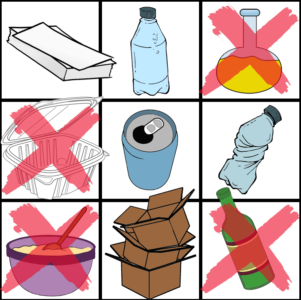
Recently, residents of Grinnell have been instructed to leave glass out of their recycling bins. According to Russ Behrens, city manager, glass has proven hard on equipment and workers and devalues single-stream, or co-mingled, recycling, in which all recyclable materials are handled together, instead of being sorted by the depositor.
This switch is just the first of what Behrens predicts will be several changes to the recycling system. In March, the City of Grinnell’s contract with Recycle Midwest, a recycling company in Oskaloosa, IA, was terminated. This prompted the City to evaluate possible alternative companies for the handling of recyclable materials.
Behrens cited Grinnell’s location as the main reason for the end of business with Recycle Midwest. Since Grinnell is located at least an hour away from most recycling companies, transporting recycling out of Grinnell is expensive.
“They’re taking less and less of our recycled materials, which lowers the value of it, which increases our cost to get rid of it,” Behrens said.
Originally, the City of Grinnell was paying Recycle Midwest $15 a ton to take their recycling. Republic Services, a company with a branch in Cedar Rapids, agreed to take on Grinnell’s recycling, at the cost of $83 a ton. In comparison, it costs the City $62.50 to dispose of a ton of garbage at the landfill.
Although residents can no longer place glass in their recycling, they still have the option to bring glass to Grinnell’s Public Service building, located at 1411 1st Avenue. From there, Republic Services collects the glass for free once the city has accumulated about 26 tons. Republic Services will also pay the City $60 a ton for sorted corrugated cardboard, for which there is a market.
With regards to Grinnell College, the City was previously removing their recycling free of charge. With the end of the contract with Recycle Midwest, however, the City of Grinnell informed Grinnell College that they would be unable to take their recycling. This resulted in the College throwing away all trash and recycling for about two weeks as they sought a new company to take their recycling. This process was ended when the City signed its new contract with Republic Services, allowing the College to recycle once again, but at the higher cost of $160 a ton.
Chris Bair, environmental and safety coordinator at the College, thinks that this price is comparable to what the College would pay if they contracted with a recycling company on their own. Bair estimates that over the course of the year the College will be paying about $20,000 to the city for about two and a half tons of recycling per week.
In addition to the cost of transporting the recycling to centers where it can be processed, Bair suggested recent tariffs set by the United States and China have influenced the abilities of recycling companies to find a market for their materials.
According to an April 8 report published by CNN, the United States Department of Commerce recommended and President Trump signed several tariffs which took effect March 23. Among them was a 25 percent tax on imported steel and a 10 percent tax on imported aluminum. In response, on April 1 China announced tariffs on 128 products from the United States, including a 25 percent tax on imported recycled aluminum. China has also announced an additional ban on many post-industrial recycled materials.
Despite these tariffs, Bair still sees aluminum as a candidate for sustainable recycling, as a market for it still exists. He encourages students to consider aluminum over glass when possible, especially as the College has not been sorting glass separately from its recycling, and instead asking students to throw it away. The College will be updating recycling signs this week to reflect the fact that glass can no longer be recycled.
With the cost of transport recyclables from municipalities to processing centers, and costs to ship the materials to plants that can transform them into new products, whether that be in China or within the United States, companies handling recyclables as commodities are faced with an ever-shifting market.
Based on the current solid waste environment, Behrens considers the increasing cost of removing recyclables to be unsustainable in the long run.
Currently, the City relies on a monthly fee of $12.60 from all residents of the city, in addition to $1.39 (including tax) per trash bag, while recycling is free. According to the City of Grinnell’s website, they provide each resident with a free red recycling bin, each additional bin costing $9.
Possible solutions include charging based on the size or number of recycling bins residents use, or switching to a self-sorting system wherein residents would transport their own recyclables to the Public Service building and sort them. Once sorted, the recycled materials have a higher value. Behrens speculated, however, that this solution would result in an increase in trash collected by the City.
“I think that one of the things cardboard has done, it’s kind of this panacea that people think ‘I can consume something as long as I recycle it,’” Behrens said. With about 66 tons of co-mingled recycling being produced each week in Grinnell, the cost of fuel to transport the recycling to processing plants and the energy required to transform the recycled materials into another product must be considered.
As Behrens sees it, even if Grinnell found a more cost-effective way to remove their recycling, the problem still would not be solved. “Just because you’re recycling, doesn’t mean you’re a responsible consumer,” Behrens said. “We’re really going to make a push, and we’ve started to do this already, the only real way we can fix the system is to reduce what we’re consuming.”



















































